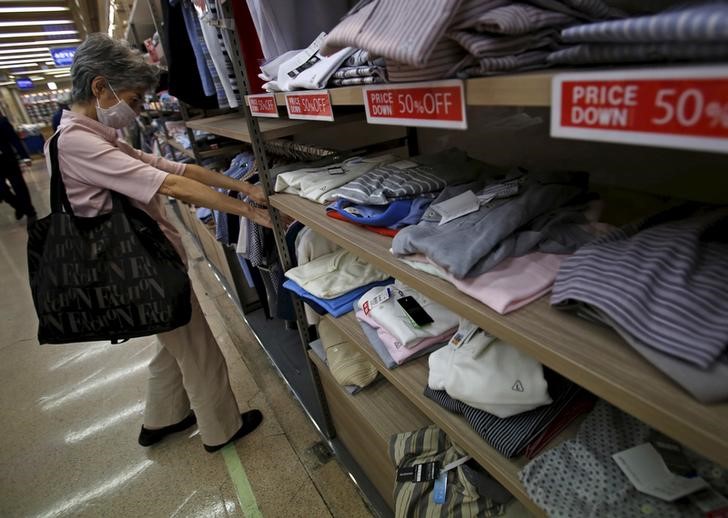By Leika Kihara
TOKYO (Reuters) - Japan's retail sales jumped in the third quarter as falling prices and gradual wage gains underpinned consumption, suggesting the economy may narrowly escape recession despite taking a hit from China's slowdown.
On a quarterly basis, retail sales increased 1.8 percent in July-September after a feeble 0.2 percent gain in April-June, a sign household spending was emerging from the doldrums.
The data offers some relief for the Bank of Japan, which is under pressure to expand stimulus further as early as Friday, when it is also expected to slash its rosy economic and price projections.
Retail sales fell 0.2 percent in September from a year earlier but rose 0.7 percent from the previous month after flat growth in August, data from the Ministry of Economy, Trade and Industry showed on Wednesday.
"The worst for consumption is over and we're seeing a steady pick-up as falling prices boost household income," said Takeshi Minami, chief economist at Norinchukin Research Institute.
"A rebound in consumption will keep the economy on track for a recovery. The BOJ probably won't ease on Friday," he added.
Japan's economy shrank in April-June and some analysts say it may have suffered another contraction in July-September as China's slowdown hurts factory output.
Given growing signs of pick-up in consumption, however, Norinchukin's Minami expects the economy to have expanded slightly in the third quarter to narrowly escape recession.
The data is among a host of indicators the BOJ will scrutinise at a crucial rate review on Friday, when it faces a key test to its rosy forecast that inflation will accelerate towards its 2 percent target next year.
Clinging to the hope that a moderate recovery is intact, many BOJ officials prefer to hold off on expanding an already massive stimulus programme that has had limited success in accelerating inflation.
But pessimists in the BOJ fret that sluggish exports and output could hurt corporate sentiment, delaying capital expenditure plans and wage hikes. That could hurt consumption and delay a sustained end to deflation.
Data due this week will underscore the patchy nature of recovery. Output was expected to fall 0.5 percent in September, while household spending was seen rising 1.2 percent from a year earlier, according to a Reuters poll.

Core consumer prices likely suffered the second straight month of annual declines in September due largely to slumping energy costs, respondents forecast, which would benefit households but would hold back price growth further below the BOJ's target.